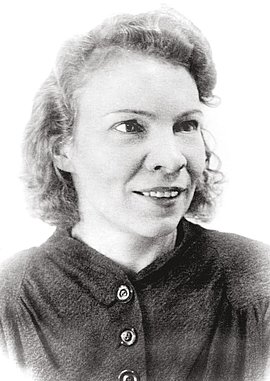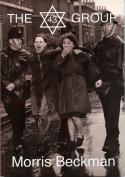Islamic Studies scholar Achim Rohde
promotes Edward Said and
anti-Zionist antisemitism
By Dr. Clemens Heni, The Berlin International Center for the Study of Antisemitism (BICSA), August 1, 2012 (another version of this article was published July 31, 2012, with algemeiner.com in New York City)
The Center for Research on Antisemitism (ZfA) at the Berlin Technical University in April 2012 appointed as a co-worker an outspoken supporter of antisemite Edward Said: Achim Rohde. A scholar in Islamic Studies, Rohde was hired because he conducts research to evaluate the similarities of “antisemitism” and “Orientalism” “in the sense of Edward Said,” as the ZfA newsletter of May 2012 declares. In addition, he will be working on the ZfA’s big project on “Islamophobia in European societies.”[1] “Islamophobia” as a research project of a Center for Research on Antisemitism? This is unscholarly in nature and politically scandalous.
The appointment of Achim Rohde is shocking for scholars on antisemitism, though a big coup for enemies of the Jewish state of Israel. Responsible for this is newly appointed head of the ZfA, historian Stefanie Schüler-Springorum. Hired in June 2011, she is a newcomer to scholarship on antisemitism. She has not published a single book on that topic – nor has Rohde.
Edward Said becomes even more mainstream
in German academia
Edward Said (1935–2003) was the leading academic anti-Zionist voice in the last decades, achieving global fame. He portrayed Arabs as the ‘new Jews’ as early as 1969.[2] He equated Israel with South-African apartheid in 1979[3] and portrayed Israel as the leading Orientalist, imperialist and racist power in his bestselling book Orientalism in 1978.[4] The chapter on Israel is the last and longest chapter in this anti-Western and antisemitic book. In an interview in 1987 Said said that Israelis had not learned the lessons from their own suffering under Nazi Germany. In his view Jews have become perpetrators now in the same way Germans or Nazis were perpetrators against the Jews.[5] In 1999 Said said that, if he could choose, he would opt for a kind of renewed Ottoman Empire. Jews could become an accepted minority, but Israel would be destroyed.[6]
Now, in 2012, Edward Said is mainstream[7] at the only German University based research center on antisemitism. They are promoting antisemitism instead of analyzing it.
Achim Rohde and the equation of antisemitism
and Orientalism
Rohde was published in 2010 by then head of the ZfA, controversial historian Wolfgang Benz.[8] Rohde promotes the fantasy that Muslims and Arabs had been victims of Germany since the 19th century, if not long before. He follows the ideology of “the Orient within.” This means: while Orientalists aim at Arabs and Muslims in the Middle East, they aim at Jews in Europe. Jews are victims of Orientalism within the homeland of the empire, Europe, so to speak, while Arabs and Muslims are victims abroad, in the Middle East and in the fantasies of artists, authors, writers, politicians, intellectuals, the public, art historians, painters etc. etc.
This equation of antisemitism and Orientalism is a denial of antisemitism, which is based on conspiracy theories, blood libels, anti-liberalism, anti-capitalism, anti-communism, anti-Westernism and many other aspects of that “longest hatred,” a term of historian Robert S. Wistrich.[9] The “lethal obsession” (Wistrich)[10] of antisemitism cannot be compared or equated with supposedly or real Orientalism and allegedly or really problematic views vis-à-vis the Arabs and Muslims. Particularly after 9/11 it has become fashionable and useful to ignore Islamism and Muslim antisemitism and to talk about Arabs, Muslims and Jews as victims of Orientalism. Anti-Zionist antisemitism is a core element of this post-Orientalist ideology, as I have shown in the work of Edward Said.
Rohde and many colleagues, who are obsessed with post-colonial ideology and Edward Said, ignore or deny the close friendship of German Emperor Wilhelm II, who traveled to the Ottoman Empire in 1898 and portrayed himself as friend of the Muslims. German Islamists remember this German-Muslim friendship until today.[11] In 1914, during the First World War, Wilhelm II initiated the Jihad of the Ottoman Empire, as Middle East Studies scholar and historian Wolfgang G. Schwanitz has shown.[12] Subsequently, the Arab Muslim Brotherhood developed close ties with the Nazis even before the Holocaust. During the Shoah, the Arab and Muslim leader at the time, Haj Amin al-Husseini, Grand Mufti of Jerusalem, collaborated with Hitler and the Germans. Nazi Germany was pro-Arab and pro-Muslim, and anti-Jewish.[13] Holocaust survivor Simon Wiesenthal documented the close relationship of the Grandmufti of Jerusalem, al-Husseini, and the Axis (Nazi Germany and fascist Italy) in 1947.[14]
Nazi scholar Hans Lindemann published a work about Islam in 1941, urging the Germans to see the similarities of the Muslim world and National Socialism.[15] A leading Nazi agitator, Johann von Leers, was happy about Islamism and converted to Islam after the defeat of Nazi Germany and went to Egypt, like many former Nazis, to spread Jew-hatred and antisemitism in that leading Arab country. Egyptian President Nasser welcomed these Nazis and collaborated with them, as the American Jewish Committee documented as early as 1957.[16] Historian Robert Wistrich analyzed the antisemitism of Egypt and von Leers in 1985.[17]
During the 1950s, the Federal Republic of Germany became a hotbed for Islamism (supported by Federal agencies), thanks to anti-communist hysteria of the time, as Pulitzer Prize winner Ian Johnson[18] and historian Stefan Meining[19] have shown in recent years. Finally, 9/11 inflamed German Schadenfreude, anti-American, anti-Israel and pro-Islamist tendencies.[20]
Rohde, from the younger generation (born 1969), is equally aggressive against critics of antisemitism as is Benz. Rohde’s thesis was about the Ba’ath Party, Saddam Hussein, gender-relations in Iraq, and the ideology of pan-Arabism.[21] He submitted his work in 2006 at the Institute for Islamic Studies at Free University Berlin. His first reader was the controversial (in Germany: prize winning) scholar Gudrun Krämer, who is known for portraying the founder of the Muslim Brotherhood, Hasan al-Banna, as a nice guy with great ideas to promote Islam.[22] She is also known for her support of the leading Sunni Islamist in the world, Yusuf al-Qaradawi,[23] who praised Adolf Hitler in January 2009 in Al-Jazeera TV, aired from Qatar, where he lives.[24]
For Rohde, Iraq Ba’ath party style pan-Arabism failed. He urges the Arab world to look for a stronger and more successful way of pan-Arab ideology and action.[25] He is against the “hegemony of globalization”[26] and refers to Edward Said, Daniel Boyarin and anti-Zionist Jacqueline Rose.[27] Why did Rohde refer to anti-Zionist and antisemitic authors in a doctoral dissertation dedicated to the analysis of Iraq, gender relations and pan-Arabism?
Boyarin and Rose have been analyzed as examples of progressive Jewish antisemitism by scholar in literature and Jewish Studies Alvin H. Rosenfeld in 2006.[28] It is telling that Rohde deleted these references at the very end of his study to Boyarin,[29] Rose and Said in his published book in 2010 on the same topic.[30]
Rohde refers to German historian Jürgen Zimmerer, a leading voice in distorting the Holocaust by universalizing it and framing colonial crimes as forerunners of the Shoah. For Rohde, imperialism, racism, and Orientalism are closely related to Nazi Germany.[31] He also compares German and Nazi “sexual politics” with those of the United States and Israel in the 20th century.[32]
The ZfA, Hazem Saghiyeh and Saleh Bashir and the Universalizing of the Holocaust
Achim Rohde is not a direct Holocaust denier; instead he trivializes and distorts the Shoah by referring to Arab authors like Hazem Saghiyeh and Saleh Bashir. Saghiyeh and Bashir published an article in 1997 in which they argued against Holocaust denial, characterizing it as too stupid an argument to be useful in their fight against Zionism.[33] Indeed, even Said is against hard-core Holocaust denial, but he said in the very same article Rohde refers to that “Zionism” is based on “apartheid.”[34]
The same holds for the article Universalising the Holocaust by Hazem Saghiyeh and Saleh Bashir.[35] They accused Israel of not having learnt the lessons from history; they distorted and trivialized the Shoah completely by equating it with racism and colonialism:
“The dissociation between the acknowledgment of the Holocaust and what Israel is doing should be the starting point for the development of a discourse which says that the Holocaust does not free the Jewish state or the Jews of accountability. On the contrary, the Nazi crime compounds their moral responsibility and exposes them to greater answerability. They are the ones who have escaped the ugliest crime in history, and now they are perpetrating reprehensible deeds against another people. Modern Jewish consciousness can no longer look at the world from the exclusive perspective of the Holocaust, in spite of the magnitude of the event and its enormity. Within these parameters, it becomes pressing to (re)present the event as a trial for human suffering more than a purely and exclusively Jewish one, especially since the Jews in recent decades have started losing their long-standing “monopoly” over the tragic. The Turk in Germany, the Algerian in France, and always the black in every place, head the columns of victims of racism in the world and in them, albeit in different proportions and degrees, is the continuation of the suffering of the Jews of which the Holocaust was the culmination.”[36]
This antisemitic argumentation which universalizes the Holocaust and therefore trivializes it is a basic assumption of Islamic Studies scholar Achim Rohde. For him, like for Saghiyeh and Bashir, Turkish, Algerian or Black people are seen in a “continuation of the suffering of the Jews of which the Holocaust was the culmination.”
This is a denial of the Holocaust if we look at the situation of Turks in Germany or Arabs and Algerians in France at any time. It is unscholarly in nature to equate the situation of immigrants or citizens with an immigrant background and the Holocaust.
In an article in 2005, Rohde thanks[37] anti-Zionist authors Moshe Zuckermann from Israel and German sociologist and anti-Zionist Klaus Holz“[38] for helpful comments and support. Holz was on the short-list for the job as head of the ZfA and Zuckermann knows Schüler-Springorum, too.[39]
For Rohde Zionism is based on „central aspects of modern antisemitism;” for him it is „a kind of identification with the aggressor.”[40] He attacks Israel and remembrance of the Shoah in Israel and urges the Arab and Muslim world not to deny the Holocaust, but to attack “Shoah remembrance in Israel”[41] from a ‘higher ground.’ This ‘higher ground’ is the distortion or trivialization of the Holocaust and not hard-core denial of it.
Achim Rohde and the campaign in support of German anti-Zionist Ludwig Watzal
In December 2008 Rohde supported an Internet campaign by a German anti-Israel and antisemitic website in support of German political scientist and anti-Zionist activist Ludwig Watzal.[42] Secretary General of the Central Council of Jews in Germany, Stephan Kramer, attacked the “antisemitic clichés” of Watzal in April 2008. Then, the Central Council of Jews in Germany pleaded to dismiss Watzal as co-worker of a Federal Agency.[43] Political scientist and expert on Islamism, Iran, and antisemitism, Matthias Küntzel, criticized Watzal in 2005 as well.[44]
In his support of Watzal, Rohde was joined by Palestinian Abdallah Frangi, Ramallah, from the PLO, antisemitic author Norman Finkelstein, left-wing politician Inge Höger, who joined the terrorist Gaza flotilla in 2010 (she was on the Mavi Marmara), and over 300 other anti-Zionist activists, scholars etc. Watzal is a particularly aggressive anti-Zionist voice in Germany. Due to many of his anti-Israel articles, critics like Social Democrat Franziska Drohsel, then head of the youth organization of the Social Democrats in Germany (Jusos), supported Jewish organizations who urged the Federal Agency for Education to take a clear stand against their co-worker Watzal. German daily Die Welt reported about the anti-Israel stand of Watzal.[45] While ZfA co-worker Achim Rohde supported Ludwig Watzal in 2008, even his colleague at the ZfA, Juliane Wetzel, criticized Watzal’s writing and his fantasies about “Jewish capital” and “Jewish power,” according to an article in 2006.[46]
Rohde, Gil Anidjar and poststructuralist,
linguistic Holocaust denial:
Jews were not killed as Jews in Auschwitz…
Rohde also sides with Middle East Studies scholar Gil Anidjar from Columbia University and his study The Jew, The Arab. A History of the Enemy from 2003,[47] because Anidjar equates antisemitism with Orientalism and portrays Muslims as victims of Nazism and the Holocaust.[48] For Anidjar, Zionism is antisemitic, because it aims at Judaism, Jews, Arabs, and Islam. He applies Said’s ideology of the “Semite” and accuses “Orientalism” of being antisemitic, including being anti-Arab.[49] This is a denial of antisemitism, of its term and ideology. Islam has a legacy of antisemitism, although on another level as Christian antisemitism. Portraying Muslims and Arabs as victims of European history is beyond reality. Islam is an imperialist religion, like Christianity. For centuries, Jews have been oppressed and murdered by Christians and also by Arabs and Muslims (on a lower scale). Since 1945 and particularly since 9/11 Islamism and Arab anti-Zionism are the biggest threat to Jews and Israel. Iran seeks nuclear weapons and its president Mahmoud Ahmadinejad is known for his incitement to genocide; he pleads for a “World without Zionism,”[50] and is followed by the entire Iranian regime and substantial parts of Western academia and activists as well. Edward Said fought for a world without Zionism, too, decades before Ahmadinejad, and even before the Iranian revolution in 1979.
Anidjar makes fun of Jews and the Holocaust and equates the fate of Jews with the history of the word “Muslim.” For him, like for fashionable Italian philosopher Giorgio Agamben Jews died as “Muslims” and not as Jews in Auschwitz.[51] This is linguistic antisemitism. These horrible games with language are mainstream in many poststructuralist, postmodern and antisemitic circles. It is shocking, though, that a scholar from the ZfA refers favorably to this parody of scholarship.
In reality Muslims were allies of the Nazis, we know of SS-Imams, Muslims in the German army, the Wehrmacht, SS-units and so on. Rohde follows Anidjar and says that both Jews and Muslims have been victims of Europe since the crusades.[52] In an interview about his book Anidjar rejects any scholarly analysis of the “new antisemitism” and equates antisemitism with racism or the situation of Muslims.[53] In 2009 Anidjar published another article and equated (and mentioned the “link” between) colonialism and the Holocaust;[54] he attacked Israel, the US and the War on Terror, in order to portray the poor and innocent Arabs (and Muslims) as victims of Israel and the US.[55] Already in his 2003 book and then in his 2009 article, Anidjar applied the grotesque distinction between “The Jew, the Arab: good Semite, bad Semite.”[56] Like Edward Said and many protagonists of post-colonial theory, he denies that antisemitism was an anti-Jewish ideology from the very beginning (and not a kind of Orientalism), starting with Wilhelm Marr’s agitation in Germany in 1879.[57] Consequently, Anidjar was a speaker in 2009 at the Israel Apartheid Week and promoted boycotting Israel and therefore Jews.[58] This is no problem and not worth mentioning for German academics like Achim Rohde or Felix Wiedemann, also a scholar from the younger generation; as quoted, Achim Rohde referred to Anidjar very positively in 2005 as well as in 2010, Wiedemann refers to Anidjar’s scandalous book from 2003 (The Jew, The Arab) in 2012, and promotes Rohde’s approach, too, embedded in esoteric, cotton-ball-style criticism.[59]
Conclusion
What is the problem with Achim Rohde’s appointment to Germany’s premier, tax-supported Center for Research on Antisemitism (ZfA) at Technical University in Berlin?
1) He supports antisemitic, anti-Zionist, post-colonial and post-Orientalist superstar Edward Said;
2) He supports German anti-Zionist and highly controversial activist Ludwig Watzal;
3) He supports antisemitic, anti-Zionist authors like Daniel Boyarin and Jacqueline Rose;
4) He supports authors who make fun of the Jewish victims of the Holocaust, who defame Israel as apartheid and promote the boycott of Israel like Gil Anidjar;
5) He supports the trivialization and in fact denial of the Holocaust by equating it with the situation of Turks in Germany today with reference to Hazem Saghiyeh and Saleh Bashir;
6) He equates antisemitism with “Orientalism” and denies the genocidal ideology of antisemitism;
7) He ignores or affirms the Iranian and Islamist threat;
8) He dwells on the fantasy of “Islamophobia” and is employed to do so by the ZfA.
The Center for Research on Antisemitism (ZfA) at the Technical University Berlin should finally change its name: it is
The German Edward Said Center for
Holocaust distortion
and post-colonial Antisemitism
[1] Newsletter, No. 42, Center for Research on Antisemitism (ZfA), Technical University Berlin, May 2012, http://zfa.kgw.tu-berlin.de/newsletter/Newsletter42.pdf (visited July 21, 2012).
[2] Edward Said (1969): The Palestinian Experience, in: Moustafa Bayoumi/Andrew Rubin (eds.) (2001), The Edward Said Reader, London: Granta Books, 14–37, 34.
[3] Edward Said (1979): Zionism from the Standpoint of its Victims, in: Bayoumi/Rubin (eds.) (2001), 114–168.
[4] Edward Said (1978): Orientalism, New York: Vintage Books.
[5] The interview reads: “[Question to Said] Given the history of the Jews and the creation of the Israeli state, because of their historical experience with persecution and suffering and holocaust [small ‚h’ in the original, CH] and death camps, should one feel that Israelis and Jews in general should be more sensitive, should be more compassionate? Is that racist? [Said] No, I don’t think it’s racist. As a Palestinian I keep telling myself that if I were in a position one day to gain political restitution for all the suffering of my people, I would, I think, be extraordinarily sensitive to the possibility that I might in the process be injuring another people“ (Edward Said (1987)/2010: The Pen and the Sword. Conversations with Edward Said. David Barsamian, introductions by Eqbal Ahmad and Nubar Hovsepian, Chicago: Haymarket Books, 42).
[6] Edward Said (1999): An Interview with Edward Said, in: Bayoumi/Rubin (eds.) (2001), 419–444, 430.
[7] In Cultural Studies, Islamic Studies, Middle East Studies, comparative literature and related fields, Said has been mainstream for a long time. See, for example, among his followers in Germany Markus Schmitz (2008): Kulturkritik ohne Zentrum. Edward W. Said und die Kontrapunkte kritischer Dekolonisation, Bielefeld: transcript (Schmitz defames the Middle East Forum’s project Campus Watch and says it is a reminder to the times of “McCarthy,” ibid., 227); Stefan Wild (2003a): Rezension von Martin Kramer, Ivory Towers on Sand. The Failure of MiddleEastern Studies in America, Washington D.C. 2001, ISBN 0-94 4029-49-3, 130 S., U.S. $ 19,95, Die Welt des Islams, Vol. 43, Nr. 2, 290–292 (this is a particularly aggressive and ironic review of Martin Kramer’s famous study Ivory Towers on Sand from 2001); Birgit Schäbler (2008): Post-koloniale Konstruktionen des Selbst als Wissenschaft: Anmerkungen einer Nahost-Historikerin zu Leben und Werk Edward Saids, in: Alf Lüdtke/Reiner Prass (Hg.) (2008): Gelehrtenleben. Wissenschaftspraxis in der Neuzeit, Köln/Weimar/Wien: Böhlau Verlag, 87–100; Schäbler is an anti-Israel author and defamed the security fence in Israel, Birgit Schäbler/Ute Behr/Stephanie Dumke (2004): The Israel-Palestinian Conflict as Result of Colonial Border-Making, Tagungsbericht, June 18, 2004, http://hsozkult.geschichte.hu-berlin.de/tagungsberichte/id=499 (visited July 23, 2012); Stefan Weidner (2011): Vom Nutzen und Nachteil der Islamkritik für das Leben, Aus Politik und Zeitgeschichte (APuZ), Nrs. 13–14/2011, 9–15; for historian Ulrich Sieg, who was on the short-list for the job as head of the ZfA, Edward Said’s Orientalism was a „master-piece,“ Ulrich Sieg (2006): Rezension von Ian Buruma, Avishai Margali, Okzidentalismus. Der Westen in den Augen seiner Feinde, WerkstattGeschichte, Vol. 15, No. 43, 137–139, 137.
[8] Achim Rohde (2010): Unter Südländern. Zur Geschichte der Orientalistik und Judaistik in Deutschland, Zeitschrift für Geschichtswissenschaft, Vol. 58, No. 7/8, 639–652. Benz edited this issue personally, in addition he is the editor of the journal, too; he introduced Rohde in his article in that issue, Wolfgang Benz (2010): Zur Genese und Tradition des Feindbildes Islam. Einleitende Bemerkungen zum Themenheft Islambilder vom Mittelalter bis zum Ersten Weltkrieg. Traditionen der Abwehr, Romantisierung, Exotisierung, Zeitschrift für Geschichtswissenschaft, Vol. 58, No. 7/8, 585–590.
[9] Robert S. Wistrich (1991): Antisemitism. The Longest Hatred, London: Methuen.
[10] Robert S. Wistrich (2010): A Lethal Obsession. Anti-Semitism from Antiquity to the Global Jihad, New York: Random House.
[11] Fritz Ahmad Gross (no year of publication indicated): Kaiser Wilhelm II. – Deutschland und der Islam, Islamische Zeitung, online http://www.enfal.de/grund44.htm (visited July 22, 2012).
[12] Wolfgang G. Schwanitz (2003): Djihad „Made in Germany“: Der Streit um den Heiligen Krieg 1914–1915, Sozial.Geschichte, No. 2/2003, 7–34; Wolfgang G. Schwanitz (2004): Die Berliner Djihadisierung des Islam. Wie Max von Oppenheim die islamische Revolution schürte, Konrad-Adenauer-Stiftung, Auslandsinformationen, No. 10/2004, 17–37; Wolfgang G. Schwanitz (2004a): Max von Oppenheim und der Heilige Krieg. Zwei Denkschriften zur Revolutionierung islamischer Gebiete 1914 und 1940, Sozial.Geschichte, Vol. 19, No. 3, 28–59.
[13] Jeffrey Herf (2009): Nazi Propaganda for the Arab World, New Haven: Yale University Press; Jeffrey Herf (2010): Hitlers Dschihad. Nationalsozialistische Rundfunkpropaganda für Nordafrika und den Nahen Osten, Vierteljahreshefte für Zeitgeschichte, Vol. 58, No. 2, 259–286; Matthias Küntzel (2002): Jihad und Judenhaß. Über den neuen antijüdischen Krieg, Freiburg: ça ira; Matthias Küntzel (2003): Ein Deutsches Schweigen. Die Vorfahren der islamischen Hamas arbeiteten gern mit den Nazis zusammen. Ein Umstand, den die deutsche Linke in ihrer Nahostsolidarität gerne ausblendet, taz, April 12, 2003, http://www.taz.de/?id=archiv&dig=2003/04/12/a0225 (visited July 23, 2012); Matthias Küntzel (2004): Von Zeesen bis Beirut. Nationalsozialismus und Antisemitismus in der arabischen Welt, http://www.matthiaskuentzel.de/contents/von-zeesen-bis-beirut (visited July 23, 2012); Klaus-Michael Mallman/Martin Cüppers (2010): Nazi Palestine. The Plans for the Extermination of the Jews in Palestine, New York: Enigma Books.
[14] Simon Wiesenthal (1947): Großmufti – Großagent der Achse, Salzburg/Wien: Ried-Verlag.
[15] Hans Lindemann (1941): Der Islam im Aufbruch, in Abwehr und Angriff. Mit 1 Karte und 4 Kunstdrucktafeln, Leipzig: Friedrich Brandstetter.
[16] American Jewish Committee (1957): The Plight of the Jews in Egypt, New York: American Jewish Committee, online: http://www.ajcarchives.org/AJC_DATA/Files/551.PDF (visited July 23, 2012).
[17] “The most prominent of these former collaborators of Hitler and Goebbels was the notorious antisemite Johann von Leers, invited to Cairo by Haj Amin el-Husseini. Von Leers had initially settled after the war in the Argentine where he edited the neo-Nazi monthly Der Weg. The Grand Mufti had repeatedly sent messages of encouragement to von Leers and his fellow Nazis in Buenos Aires and in August 1956 he had publicly complimented Der Weg for having ‚always championed the Arabs’ righteous cause against the powers of darkness embodied in World Jewry’’. An exalted figure in Nasser’s entourage, the ex-Mufti of Jerusalem obtained a post for von Leers as political adviser in the Egyptian Information Department, where, according to the Manchester Guardian, he exercised ‚considerable influence on the nature of the current anti-Jewish measures’. Von Leers continued to be active as an antisemitic propagandist in Cairo under his Muslim name, Omar Amin, until his death in 1965,” (Robert Wistrich (1985): Hitler’s Apocalypse. Jews and the Nazi Legacy, London: Weidenfeld & Nicolson, 176).
[18] Ian Johnson (2005): The Beachhead. How a Mosque for Ex-Nazis became Center for Radical Islam, The Wall Street Journal, July 12, 2005; Ian Johnson (2010): A Mosque in Munich. Nazis, the CIA and the Rise of the Muslim Brotherhood in the West, San Diego (CA): Houghton Mifflin Harcourt.
[19] Stefan Meining (2011): Eine Moschee in Deutschland. Nazis, Geheimdienste und der Aufstieg des politischen Islam im Westen, Munich: C.H.Beck.
[20] For a comprehensive critique of German Islamic Studies, scholars in antisemitism and the public in Germany after 9/11 see my book Clemens Heni (2011): Schadenfreude: Islamforschung und Antisemitismus in Deutschland nach 9/11, Berlin: Edition Critic.
[21] Achim Rohde (2006): Facing Dictatorship. State-Society Relations in Ba’Thist Iraq. Zur Erlangung des Doktorgrades eingereicht am Fachbereich Geschichts- und Kulturwissenschaften der Freien Universität Berlin im April 2006, manuscript, Free University Berlin, Institute for Islamic Studies.
[22] Gudrun Krämer (2010): Hasan al-Banna, Oxford/New York: Oneworld Publications.
[23] Gudrun Krämer (2006): Drawing Boundaries. Yusuf al-Qaradawi on Apostasy, in: Gudrun Krämer/Sabine Schmidtke (eds.) (2006): Speaking for Islam. Religious Authorities in Muslim Societies, Leiden/Boston: Brill, 181–217; Gudrun Krämer (2009): Preface, in: Bettina Gräf/Jakob Skovgaard-Petersen (eds.) (2009): Global Mufti. The Phenomenon of Yusuf al-Qaradawi, London: Hurst & Company (2009), ix–xi.
[24] For an overview on many more antisemitic statements of al-Qaradawi see http://www.memri.org/report/en/print5020.htm (visited July 23, 2012).
[25] Rohde 2006, 425; see also Achim Rohde (2005): Der Innere Orient. Orientalismus, Antisemitismus und Geschlecht im Deutschland des 18. bis 20. Jahrhunderts, Die Welt des Islams, Vol. 45, Nr. 2, 370–411; Achim Rohde (2009): The Orient Within. Orientalism, Anti-Semitism and Gender in 18th to early 20th Century Germany, in: Benjamin Jokisch/Ulrich Rebstock/Lawrence I. Conrad (eds.) (2009): Fremde, Feinde und Kurioses. Innen- und Außenansichten unseres muslimischen Nachbarn, Berlin/New York: Walter de Gruyter, 147–165; Achim Rohde (2010a): State-Society Relations in Ba’Thist Iraq Facing Dictatorship, London/New York: Routledge (this is his shortened 2006 dissertation).
[27] See footnote 12 (which belongs to the chapter „Conclusions“), Rohde 2006, 428: „Edward Said, Freud and the Non-European (London: Verso, 2003), 49, 53/54. See also Stephen Sheehi, ‚Failure, Modernity, and the Works of Hisham Sharabi: Towards a Post-Colonial Critique of Arab Subjectivity,’ Critique 10 (1997): 39–54; Daniel Boyarin, ‚The Colonial Drag: Zionism, Gender, and Mimikry,’ in the Pre-Occupation of Post-Colonial Studies, eds. Fawzia Afzal-Khan and Kalpana Seshadri-Crooks (Durham/London: Duke Univ. Press, 2000), 234–265; Jacqueline Rose, The Question of Zion (Princeton: Princeton Univ. Press, 2005).“ Remember: these are quotes from the end of Rohde’s doctoral dissertation, which is about Iraqi history, gender relations, dictatorship and pan-Arabism. He quotes antisemites in such a study: this indicates his hatred of Israel as a Jewish state.
[28] Alvin H. Rosenfeld (2006): „Progressive“ Jewish Thought and the new anti-Semitism, http://www.ajc.org/atf/cf/%7B42D75369-D582-4380-8395-D25925B85EAF%7D/PRO
GRESSIVE_JEWISH_THOUGHT.PDF (visited July 22, 2012).
[29] Rohde refers to above quoted article of Daniel Boyarin; the dedication of Boyarin’s article reads like this: „To Michel Warschawsky and Tikva Parnas, tireless fighters against the Zionist occupation in all Palestine,” (Daniel Boyarin (2000): ‚The Colonial Drag: Zionism, Gender, and Mimikry,’ in: Fawzia Afzal-Khan/Kalpana Seshadri-Crooks (eds.) (2000): The Pre-Occupation of Post-Colonial Studies, Durham/London: Duke University Press, 234–265, 234). The expression „All Palestine” aims at the destruction of Israel. Furthermore one can find the close relationship of antisemites like Boyarin and post-colonial superstars like Bhabha, who share this antisemitism: „I wish to express gratitude to Homi K. Bhabha, who read a much earlier and a very recent version of this essay and whose influence is felt on every page, even where I have not been able to assimilate it completely,” (Boyarin 2000, 259).
[31] See Rohde 2005, 389, footnote 40, reference to Zimmerer. For a close analysis of the scholarly failure of Jürgen Zimmerer see Jakob Zollmann (2007): Polemics and other arguments – a German debate reviewed, Journal of Namibian Studies, [Vol. 1], No. 1, 109–130 and my forthcoming book Antisemitism: A Specific Phenomenon.
[32] Rohde 2010a, 209, footnote 84.
[33] Rohde 2010a, 213, footnote 4.
[34] Edward Said (1998): Der dritte Weg führt weiter. An die arabischen Unterstützer von Roger Garaudy, Le Monde Diplomatique, German version: http://www.monde-diplomatique.de/pm/1998/08/14/a0226.text.name,askOg6bPY.n,36 (visited July 23, 2012).
[35] Hazem Saghiyeh/Saleh Bashir (1997)/1998: Universalizing the Holocaust. How Arabs and Palestinians relate to the Holocaust and how the Jews relate to the Palestinian victim, Palestine-Israel Journal, Vol. 5, Nos. 3 & 4, 1998, online: http://www.pij.org/details.php?id=382 (visited July 22, 2012). The Arab original has been published in 1997.
[36] Saghiyeh/Bashir 1997.
[37] Rohde 2005, Rohde 2009.
[38] Rohde 2005, 370, footnote 1.
[39] For example, Schüler-Springorum and Zuckermann were part of a small symposium in Berlin in May 2010, http://www.jmberlin.de/main/DE/02-Veranstaltungen/veranstaltungen-2010/2010_05_22_symposium.php (visited July 22, 2012).
[42] http://www.arendt-art.de/deutsch/palestina/Honestly_Concerned/watzal_ludwig_aktion.htm (visited July 21, 2012): „307 Dr. Achim Rohde D Hamburg wissenschaftlicher Mitarbeiter, Georg-Eckert-Institut für internationale Schulbuchforschung.“
[43] „Zentralrat fordert Entlassung eines Redakteurs der Bundeszentrale für politische Bildung,“ April 5, 2008, http://www.zentralratdjuden.de/de/article/1625.html (visited July 22, 2012).
[44] http://www.matthiaskuentzel.de/contents/tag-watzal-darf-ich-sie-antisemit-nennen (visited July 22, 2012).
[45] Richard Herzinger (2008): Mitarbeiter schreibt israelfeindliche Texte. Bundeszentrale für Politische Bildung, Die Welt, April 10, 2008, http://www.welt.de/politik/article1885758/Mitarbeiter
_schreibt_israelfeindliche_Texte.html (visited July 23, 2012).
[46] Alexandra Makarova (2006): Neutrales Haus in Erklärungsnot. Bei der Bundeszentrale für politische Bildung häufen sich Israel-kritische Peinlichkeiten, June 2006, http://www.j-zeit.de/archiv/artikel.361.html (visited July 22, 2012).
[47] Gil Anidjar (2003): The Jew, The Arab. A History of the Enemy, Stanford: Stanford University Press.
[48] Rohde refers several times to Anidjar, see Rohde 2010, 645 (with reference to Anidjar 2003); Rohde 2005, 385, 400f.
[49] Anidjar 2003, 192–193, endnote 51.
[50] Mahmoud Ahmadinejad (2005): Speech at the Conference „A World Without Zionism,“ October 26, 2005, Teheran, translation by Nazila Fathi, New York Times, 30.10.2005, http://www.nytimes.com/2005/10/30/weekinreview/30iran.html?pagewanted=1&_r=1 (visited July 23, 2012).
[51] Gil Anidjar (2003a): Interview „The Jew, the Arab,” http://asiasociety.org/countries/religions-philosophies/jew-arab-interview-gil-anidjar (visited July 22, 2012).
[54] Gil Anidjar (2009): Can the walls hear?, Patterns of Prejudice, Vol. 43, Nos. 3/4, 251–268, 266.
[57] Wilhelm Marr (1879): Der Sieg des Judenthums über das Germanenthum. Vom nicht confessionellen Standpunkt aus betrachtet, Bern: Rudolph Costenoble; Wilhelm Marr (1879a): Vom jüdischen Kriegsschauplatz. Eine Streitschrift, Bern: Rudolph Costenoble.
[58] „At Columbia University (CU), a recently formed group called the Columbia Palestine Forum (CPF) hosted a teach-in on March 4 that featured CU professors and students that are members of CPF, a group advocating for the university to divest from Israel. Speakers compared the Israeli-Palestinian conflict to apartheid in South Africa and one professor, Gil Anidjar, an Assistant Professor in the Middle East and Asian Languages and Cultures (MEALAC) department, advocated for a boycott as an ‚exercise of freedom‘“ (http://www.adl.org/NR/exeres/2F101AAE-F472-450F-8C13-53825A79D075,DB7611A2-02CD-43AF-8147-649E26813571,frameless.htm (04.08.2010)).
[59] It is disturbing and problematic that historian Felix Wiedemann refers to Anidjar 2003 positively, without the slightest analysis of his antisemitism. In an overview article for a online encyclopedia about Edward Said, Orientalism, and the Orientalism debate, Wiedemann also sides with Achim Rohde, Felix Wiedemann (2012): Orientalismus, Version: 1.0, in: Docupedia-Zeitgeschichte, April 19, 2012, https://docupedia.de/zg/Orientalismus?oldid=82032#cite_ref-69 (visited July 23, 2012). Wiedemann ignores one of the most updated overviews on Edward Said, a critique of Said’s antisemitism, and particularly the portrayal of Muslims and Arabs as the new Jews, an ideology of Said from the late 1960s (if not earlier): Heni 2011, 76–136. The most shocking aspect of Wiedemann’s piece, though, is his positive reference to antisemite and anti-Israel activist Gil Anidjar. Wiedemann is also not mentioning the antisemitic ideology of Said in its entirety, although he pretends to be a bit skeptical about him; he does quote a few other works of Said than Orientalism but does not mention that Said introduced the concept of Arabs as the ‘new Jews’ as early as 1969, a core element of today’s antisemitism and anti-Zionism and distortion of history. It is remarkable that a young historian like Wiedemann does not even mention that Said equated Israel with apartheid (although, in a completely other context, apartheid South Africa is mentioned in Wiedemann’s piece!), for example. Following an antisemitic author like Gil Anidjar is indicating a failure of scholarship.

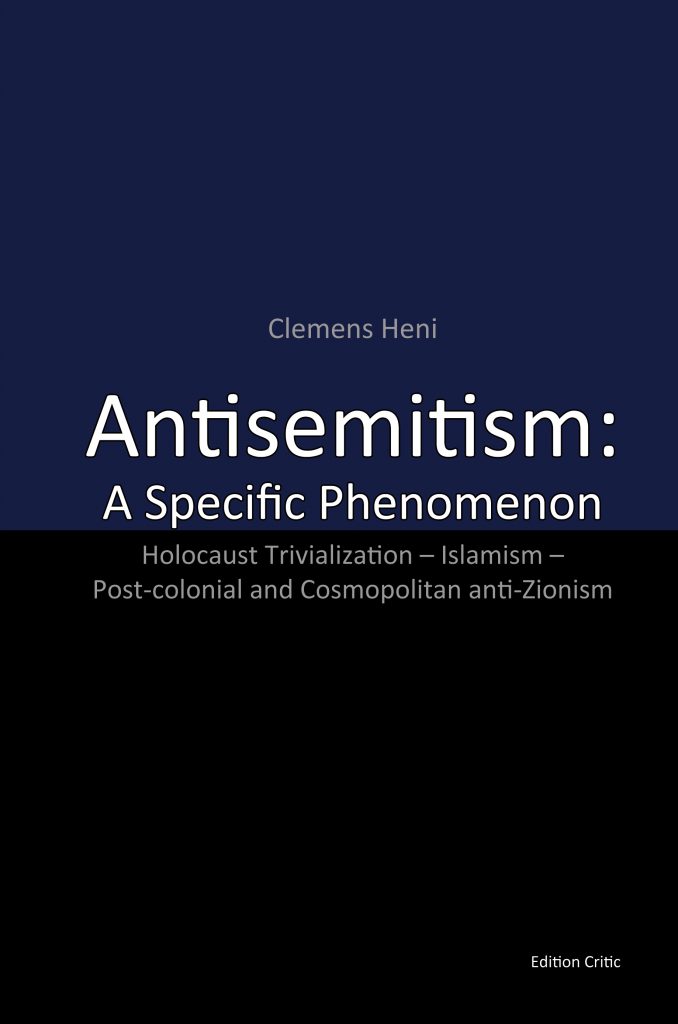



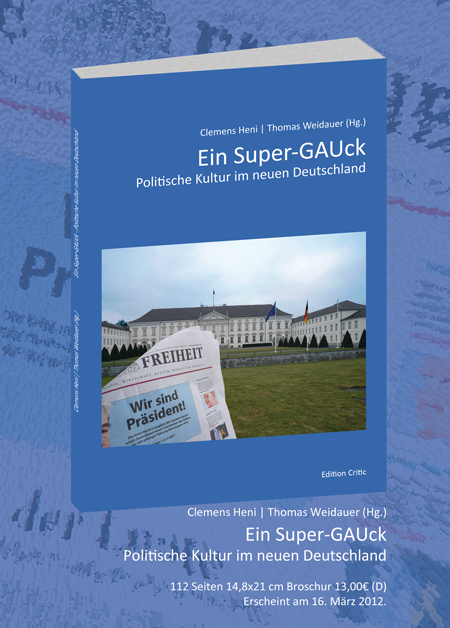
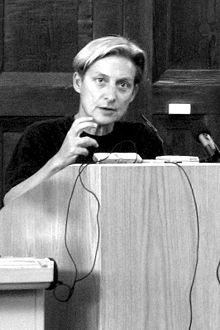
 (Yale University) wurde 2012 in Deutschland ebenfalls geehrt. Sie erhielt am 8. Mai den Dr. Leopold Lucas-Preis der Universität Tübingen für ihren Einsatz für Hospitalität und „universelle Menschenrechte“ – auch dieser Preis ist mit 50.000€ dotiert, was ja von der schwäbischen Alma Mater freundlich ist, wenn man bedenkt, wie schlecht bekanntlich die Yale University ihre Professoren bezahlt. Benhabibs Vorbilder sind Immanuel Kant („Der Ewige Frieden“ von 1795) und Hannah Arendt. Die problematischen Aspekte dieser Art von Kosmopolitanismus oder vielmehr die anti-israelische Dimension bei Arendt, kehren bei Benhabib verstärkt wieder. 2010 diffamierte sie Israel indem sie es mit der südafrikanischen Apartheid und mit den „1930er Jahren in Europa“ (sie erwähnt den Slogan „Eine Nation, Ein Land, Ein Staat“ und spielt offensichtlich auf Nazi-Deutschland an) verglich – während selbstverständlich auch sie den Jihadismus z.B. der Gaza Flottille ignorierte und ihn bis heute ausblendet. Dies sind die eigentlichen Gründe für die Ehrungen und den Beifall aus Deutschland für Personen wie Butler und Benhabib. Kritik an Arendt, Kant und der europäischen Ideologie (wie sie auch Jürgen Habermas vertritt) eines Post-Nationalstaats-Zeitalter, wie sie von dem israelischen Philosophen Yoram Hazony bekannt ist, wird in Deutschland entweder gar nicht zur Kenntnis genommen oder abgewehrt. Aufgegriffen und promotet wird sie höchstens von problematischen, nicht pro-israelischen, vielmehr deutsch-nationalen, rechten und konservativen Kreisen wie der Zeitschrift Merkur (dessen Autor Siegfried Kohlhammer den Islam mit seinen Dhimmi-Regelwerken für Nicht-Muslime schlimmer findet als den Nationalsozialismus und die Nürnberger Gesetze, und der zudem gegen Israel argumentiert).
(Yale University) wurde 2012 in Deutschland ebenfalls geehrt. Sie erhielt am 8. Mai den Dr. Leopold Lucas-Preis der Universität Tübingen für ihren Einsatz für Hospitalität und „universelle Menschenrechte“ – auch dieser Preis ist mit 50.000€ dotiert, was ja von der schwäbischen Alma Mater freundlich ist, wenn man bedenkt, wie schlecht bekanntlich die Yale University ihre Professoren bezahlt. Benhabibs Vorbilder sind Immanuel Kant („Der Ewige Frieden“ von 1795) und Hannah Arendt. Die problematischen Aspekte dieser Art von Kosmopolitanismus oder vielmehr die anti-israelische Dimension bei Arendt, kehren bei Benhabib verstärkt wieder. 2010 diffamierte sie Israel indem sie es mit der südafrikanischen Apartheid und mit den „1930er Jahren in Europa“ (sie erwähnt den Slogan „Eine Nation, Ein Land, Ein Staat“ und spielt offensichtlich auf Nazi-Deutschland an) verglich – während selbstverständlich auch sie den Jihadismus z.B. der Gaza Flottille ignorierte und ihn bis heute ausblendet. Dies sind die eigentlichen Gründe für die Ehrungen und den Beifall aus Deutschland für Personen wie Butler und Benhabib. Kritik an Arendt, Kant und der europäischen Ideologie (wie sie auch Jürgen Habermas vertritt) eines Post-Nationalstaats-Zeitalter, wie sie von dem israelischen Philosophen Yoram Hazony bekannt ist, wird in Deutschland entweder gar nicht zur Kenntnis genommen oder abgewehrt. Aufgegriffen und promotet wird sie höchstens von problematischen, nicht pro-israelischen, vielmehr deutsch-nationalen, rechten und konservativen Kreisen wie der Zeitschrift Merkur (dessen Autor Siegfried Kohlhammer den Islam mit seinen Dhimmi-Regelwerken für Nicht-Muslime schlimmer findet als den Nationalsozialismus und die Nürnberger Gesetze, und der zudem gegen Israel argumentiert).






